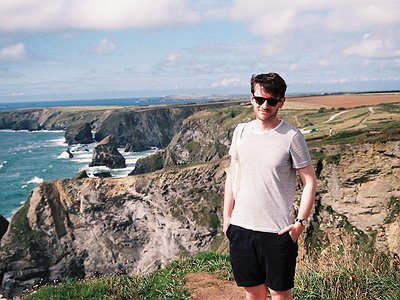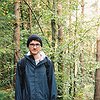Part 1
Name: Correspondence / Ben Catt
Nationality: British
Occupation: Electronic musician and library worker
Current Release: Wave Recital on Audiobulb
Recommendation: Two works which have resonated with me recently are Katie Paterson’s ‘Earth-Moon-Earth’ and Jiayu Liu’s ‘Ocean Wave’.
You can listen to and buy Ben's music at his Bandcamp site correspondence.bandcamp.com
When did you start writing/producing music - and what or who were your early passions and influences? What is it about music and/or sound that drew you to it?
My first attempts at music were in my mid-teens. I had a few old keyboards, a nylon-strung guitar and a borrowed drum kit. It was exciting to create little escapist sound worlds, make tapes and invent band names. Those were formative years and I was just starting to discover so much music through the internet, but I suppose the main influence at the time was Phil Elverum (whose work I’ve followed ever since).
For most artists, originality is first preceded by a phase of learning and, often, emulating others. How would you describe your own development as an artist and the transition towards your own voice? What is the relationship between copying, learning and your own creativity?
I still consider myself to be in that learning phase. Most tracks begin as an attempt to copy something else I’ve heard, usually from another time or place entirely (e.g. 70s Japanese minimalism). Of course, the results usually end up sounding completely different, but those parts might then become the focus of a new, original piece. I try to learn from failed attempts, saving lots of draft versions along the way.
What were your main compositional- and production-challenges in the beginning and how have they changed over time?
I was always pretty uncertain of the music I made and reluctant to share anything too widely. Playing in the group Molars from 2014 to 2016 was challenging in its own right, but gave me confidence in making music socially and letting it be heard by indifferent strangers.
What was your first studio like? How and for what reasons has your set-up evolved over the years and what are currently some of the most important pieces of gear for you?
My ‘studio’ has travelled around with me from place to place; a laptop, hard drive, SM57 and mixer. I like keeping things tidy and getting rid of gear that’s no longer useful. All the Correspondence tracks so far have been recorded at home - a small flat in the centre of York, within earshot of the train station.
I know it’s basic, but GarageBand is my most important tool for figuring out ideas and getting them down quickly. I like discovering its glitches and pushing its limitations as far as they can go.
How do you make use of technology? In terms of the feedback mechanism between technology and creativity, what do humans excel at, what do machines excel at?
Technology is useful for automation and repetition. A lot of my tracks, particularly on Earlier Music, involve setting up a process then just letting it play out. The human element comes later in editing, mixing and sequencing. I’m interested in exploring what sort of music computers can make without intervention - giving up control and removing ourselves from the loop.
Production tools, from instruments to complex software environments, contribute to the compositional process. How does this manifest itself in your work? Can you describe the co-authorship between yourself and your tools?
My approach these days involves arranging MIDI notes or editing sound waves onscreen, rather than recording live or working out ideas on paper. If I come up with an idea spontaneously whilst playing piano or guitar then I’ll often use software to try to fragment it and turn it into something unrecognisable. The pieces on Wave Recital involved a lot of copying and pasting, a gradual trial and error approach which I can probably only get away with in a home studio environment.
Collaborations can take on many forms. What role do they play in your approach and what are your preferred ways of engaging with other creatives through, for example, file sharing, jamming or just talking about ideas?
David Newman (who makes music as Autistici, and runs the Audiobulb label) has been a great collaborator in terms of advice and mastering. He recently asked me to contribute to a piece titled Endless Endless which stitches together short (2 minute) tracks from lots of different artists. I enjoy that sort of remote collaboration and making connections on a global scale. I’m currently looking at different platforms to share stems for producers to use freely in their own projects.
Could you take us through a day in your life, from a possible morning routine through to your work? Do you have a fixed schedule? How do music and other aspects of your life feed back into each other - do you separate them or instead try to make them blend seamlessly?
I like to keep my days busy and on schedule. I’m usually up quite early, breakfast and coffee, then I cycle to the university library where I work. I spend my lunch hour playing piano in the music department and I also take lessons every couple of weeks. Musical and professional lives are quite separate, although I think they occupy a similar part of my brain for developing systems and organising collections. I usually find time for making music on weekend mornings or days off, although I’d rather be outdoors somewhere if the weather’s nice.






